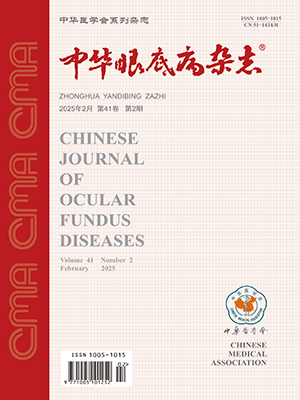| 1. |
|
| 2. |
|
| 3. |
Kang Q, Yang C. Oxidative stress and diabetic retinopathy: molecular mechanisms, pathogenetic role and therapeutic implications[J/OL]. Redox Biol, 2020, 37: 101799[2020-11-13]. https://pubmed.ncbi.nlm.nih.gov/33248932/. DOI: 10.1016/j.redox.2020.101799.
|
| 4. |
Tan TE, Wong TY. Diabetic retinopathy: looking forward to 2030[J/OL]. Front Endocrinol (Lausanne), 2024, 13: 1077669[2023-01-09]. https://pubmed.ncbi.nlm.nih.gov/36699020/. DOI: 10.3389/fendo.2022.1077669.
|
| 5. |
|
| 6. |
Julius A, Renuka RR, Hopper W, et al. Inhibition of aldose reductase by novel phytocompounds: a heuristic approach to treating diabetic retinopathy[J/OL]. Evid Based Complement Alternat Med, 2022, 2022: 9624118[2022-03-21]. https://pubmed.ncbi.nlm.nih.gov/35356240/. DOI: 10.1155/2022/9624118.
|
| 7. |
刘家琦,李凤鸣. 视网膜病[M]//刘家琦, 李凤鸣. 实用眼科学. 北京: 人民卫生出版社, 2010: 207-215.Liu JQ, Li FM. Retinopathy[M]//Liu JQ, Li FM. Practical ophthalmology. Beijing: People's Medical Publishing House, 2010: 207-215.
|
| 8. |
|
| 9. |
Wang W, Lo ACY. Diabetic retinopathy: pathophysiology and treatments[J/OL]. Int J Mol Sci, 2018, 19(6): 1816[2018-06-20]. https://pubmed.ncbi.nlm.nih.gov/29925789/. DOI: 10.3390/ijms19061816.
|
| 10. |
|
| 11. |
|
| 12. |
|
| 13. |
|
| 14. |
Wang Z, Feng C, Yang R, et al. Large-area photoreceptor degeneration model in rabbits by photocoagulation and oxidative stress in the retina[J/OL]. Front Neurosci, 2021, 15: 617175[2021-06-10]. https://pubmed.ncbi.nlm.nih.gov/34177442/. DOI: 10.3389/fnins.2021.617175.
|
| 15. |
|
| 16. |
|
| 17. |
|
| 18. |
|
| 19. |
Yusuf IH, Henein C, Sivaprasad S. Infographic: panretinal photocoagulation vs intravitreous ranibizumab for proliferative diabetic retinopathy (PDR): DRCR. net Protocol S[J/OL]. Eye (Lond), 2023, 2023: E1(2023-04-21)[2024-07-08]. https://pubmed.ncbi.nlm.nih.gov/37085719/. DOI: 10.1038/s41433-023-02396-0. [published online ahead of print].
|
| 20. |
|
| 21. |
|
| 22. |
Chen J, Wang H, Qiu W. Intravitreal anti-vascular endothelial growth factor, laser photocoagulation, or combined therapy for diabetic macular edema: a systematic review and network meta-analysis[J/OL]. Front Endocrinol (Lausanne), 2023, 14: 1096105[2023-02-02]. https://pubmed.ncbi.nlm.nih.gov/36817588/. DOI: 10.3389/fendo.2023.1096105.
|
| 23. |
|
| 24. |
|
| 25. |
|
| 26. |
|
| 27. |
|
| 28. |
|
| 29. |
徐玥. PDR围手术期玻璃体内抗VEGF药物注射的最佳时机初探[D]. 淮南: 安徽理工大学, 2021.Xu Y. A preliminary study on the optimal timing of intravitreal anti-VEGF drug injection during the perioperative period of PDR[D]. Huainan: Anhui University of Science and Technology, 2021.
|
| 30. |
|
| 31. |
|
| 32. |
|
| 33. |
赵宇. 玻璃体切割术联合康柏西普治疗增殖性糖尿病视网膜病变的疗效研究[D]. 沈阳: 中国医科大学, 2022.Zhao Y. Efficacy of vitrectomy combined with conbercept in the treatment of proliferative diabetic retinopathy[D]. Shenyang: China Medical University, 2022.
|
| 34. |
|
| 35. |
白旭旭. 增殖性糖尿病视网膜病变患者玻璃体切除术后不同抗VEGF治疗方案的疗效比较[D]. 延安: 延安大学, 2023.Bai XX. Comparison of the efficacy of different anti-VEGF treatment regimens in patients with proliferative diabetic retinopathy after vitrectomy[D]. Yan'an: Yan'an University, 2023.
|
| 36. |
Tang Y, Shi Y, Fan Z. The mechanism and therapeutic strategies for neovascular glaucoma secondary to diabetic retinopathy[J/OL]. Front Endocrinol (Lausanne), 2023, 14: 1102361[2023-01-23]. https://pubmed.ncbi.nlm.nih.gov/36755912/. DOI: 10.3389/fendo.2023.1102361.
|
| 37. |
|
| 38. |
|
| 39. |
|
| 40. |
|
| 41. |
|
| 42. |
|
| 43. |
Liberski S, Wichrowska M, Kocięcki J. Aflibercept versus faricimab in the treatment of neovascular age-related macular degeneration and diabetic macular edema: a review[J/OL]. Int J Mol Sci, 2022, 23(16): 9424[2022-08-20]. https://pubmed.ncbi.nlm.nih.gov/36012690/. DOI: 10.3390/ijms23169424.
|
| 44. |
|
| 45. |
Wijesingha N, Gibson K, Willis JR, et al. Infographic: 2-year efficacy, durability and safety of intravitreal faricimab with treat-and-extend dosing up to 16 weeks in diabetic macular oedema (pooled results from yosemite and rhine)[J/OL]. Eye (Lond), 2024, 2024: E1(2024-07-29)[2021-07-08]. https://pubmed.ncbi.nlm.nih.gov/39075261/. DOI: 10.1038/s41433-024-03249-0. [published online ahead of print].
|
| 46. |
Wang M, Wang L, Gong Y, et al. Study on the effects of different anti-vegf drugs on fibrovascular membranes of proliferative diabetic retinopathy[J/OL]. Photodiagnosis Photodyn Ther, 2023, 42: 103530[2023-04-14]. https://pubmed.ncbi.nlm.nih.gov/37060987/. DOI: 10.1016/j.pdpdt.2023.103530.
|
| 47. |
|
| 48. |
|
| 49. |
|
| 50. |
|
| 51. |
|
| 52. |
Li S, Tao Y, Yang M, et al. Aflibercept 5+PRN with retinal laser photocoagulation is more effective than retinal laser photocoagulation alone and aflibercept 3+PRN with retinal laser photocoagulation in patients with high-risk proliferative diabetic retinopathy and diabetic macular edema: a 12-month clinical trial[J/OL]. Front Endocrinol (Lausanne), 2024, 15: 1286736[2024-02-22]. https://pubmed.ncbi.nlm.nih.gov/38455651/. DOI: 10.3389/fendo.2024.1286736.
|
| 53. |
|
| 54. |
Gao J, Tao L, Jiang Z. Alleviate oxidative stress in diabetic retinopathy: antioxidant therapeutic strategies[J/OL]. Redox Rep, 2023, 28(1): 2272386[2023-12-02]. https://pubmed.ncbi.nlm.nih.gov/38041593/. DOI: 10.1080/13510002.2023.2272386.
|
| 55. |
|
| 56. |
|
| 57. |
|
| 58. |
Lee CH, Lui DT, Cheung CY, et al. Circulating AFABP, FGF21, and PEDF levels as prognostic biomarkers of sight-threatening diabetic retinopathy[J/OL]. J Clin Endocrinol Metab, 2023, 108(9): e799-e806[2023-08-18]. https://pubmed.ncbi.nlm.nih.gov/36856742/. DOI: 10.1210/clinem/dgad112.
|
| 59. |
|




